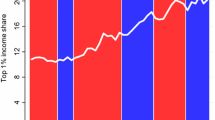Abstract
A well-developed theoretical literature suggests that central bank independence causes low inflation. Empirical work supporting this hypothesis is unsatisfactory, however, for two reasons: statistical analysis has only recently begun to include control variables, and important political variables that are related to inflation have not yet been included; analysis has not yet undertaken a systematic comparison of alternative indices of central bank independence. This paper addresses both weaknesses by testing the explanatory power of eight indices of central bank independence in a political-economic model of inflation. The results suggest that while support for the central bank independence hypothesis survives a relatively inclusive set of control variables, support for the hypothesis is not independent of the particular index upon which analysis relies.
Similar content being viewed by others
References
Alesina, A. (1987).Macroeconomic policy in a twoparty systemas a repeated game. Quarterly Journal of Economics102: 651–678.
Alesina, A. (1988). Macroeconomics and politics. In S. Fischer (Ed.), NBER Macroeconomic Annual, 1988. Cambridge: MIT Press.
Alesina, A. (1989). Politics and business cycles in industrial democracies. European Policy8: 57–98.
Alesina, A. and Summers, L. (1993). Central bank independence and macroeconomic performance: Some comparative evidence. Journal of Money, Credit, and Banking25: 151–162.
Al-Mahrubi, F. and Willett, T. (1995). The antiinflationary influence of corporatist structures and central bank independence: The importance of the humpshaped hypothesis. Public Choice84: 153–162.
Banaian, K., Burdekin, R. and Willett, T. (1995). On the political economy of central bank independence. In K. Hoover and S. Sheffrin (Eds.), Monetarism and the methodology of economics. Brookfield: Edward Elgar.
Barro, R. and Gordon, D. (1983). Rules, discretion, and reputation in a model of monetary policy. Journal of Monetary Economics12: 101–122.
Beck, N. and Katz, J. (1995). What to do (and not to do) with timeseriescrosssectional data in comparative politics. American Political Science Review89: 634–647.
Blackburn, K. and Christensen, M. (1989). Monetary policy and policy credibility: theories and evidence. Journal of Economic Literature XXVII: 1–45.
Calmfors, L. and Driffill, J. (1988). Centralisation of wage bargaining and macroeconomic performance. Economic Policy6: 13–61.
Cameron, D. (1984). Social democracy, corporatism, labor quiescence and the representation of labor interest in advanced capitalist society. In J. Goldethorpe (Ed.), Order and conflict in contemporary capitalism. New York: Oxford University Press.
Cukierman, A. (1992). Central bank strategy, credibility, and independence: Theory and evidence. Cambridge: MIT Press.
Cukierman, A., Webb, S. and Neyapti, B. (1994). Measuring central bank independence and its effect on policy outcomes. International Center for Economic Growth Occasional Paper no. 58.
Epstein, G. and Schorr, J. (1986). The political economy of central banking. Discussion paper no. 1281. Harvard Institute of Economic Research.
Fischer, S. (1986). Indexing, inflation, and economic policy. Cambridge: MIT Press.
Greider, W. (1987). Secrets of the Temple: How the Federal Reserve runs the country. New York: Simon and Schuster.
Grilli, V., Donato, M. and Tabellini, G. (1991). Political and monetary institutions and public financial policies in the industrial countries. Economic Policy6: 342–392.
Havrilesky, T. (1993). The pressures on American monetary policy. Boston: Kluwer Academic Publishers.
Havrilesky, T. and Granato, J. (1993). Determinants of inflationary performance: Corporatist structures vs. central bank autonomy. Public Choice76: 249–261.
Hibbs, D.A. Jr. (1985). Inflation, political support and macroeconomic policy. In L. Lindberg and S. Maier (Eds.), The politics of inflation and economic stagnation. Washington DC: The Brookings Institution.
Hibbs, D.A. Jr. (1987). The political economy of industrial democracies. Cambridge: Harvard University Press.
Keech, W.R. (1995). Economic politics: The costs of democracy. Cambridge: Cambridge University Press.
Kydland, F. and Prescott, E. (1977). Rules rather than discretion: The inconsistency of optimal plans. Journal of Political Economy85: 473–490.
Rogoff, K. (1985). The optimal degree of commitment to an intermediate monetary target. Quarterly Journal of Economics110: 1169–1190.
Visser, J. (1989). European Trade Unions in figures. Deventer, Netherlands: Kluwer Law and Taxation Publishers.
Visser, J. (1990). In search of inclusive unionism. Bulletin of Comparative Labour Relations, Vol. 18. Deventer, Netherlands: Kluwer Law and Taxation Publishers.
Visser, J. (1991). Trends in Trade Union membership. OECDEconomic Outlook. Paris:O ECD.
Woldendorp, J., Keman, H. and Budge, I. (1993). European Journal of Political Research24: 1–120.
Author information
Authors and Affiliations
Rights and permissions
About this article
Cite this article
Oatley, T. Central bank independence and inflation: Corporatism, partisanship, and alternative indices of central bank independence. Public Choice 98, 399–413 (1999). https://doi.org/10.1023/A:1018309521386
Issue Date:
DOI: https://doi.org/10.1023/A:1018309521386




